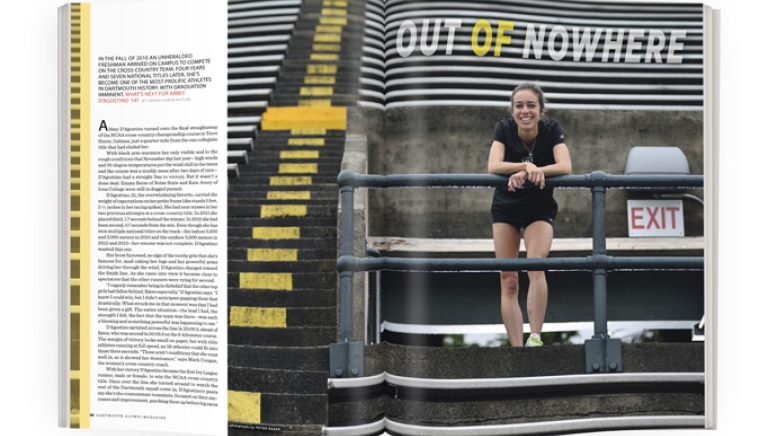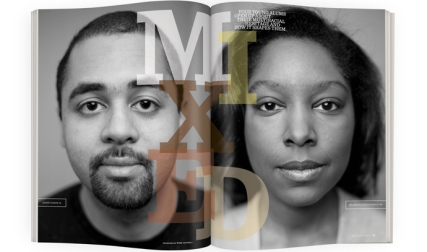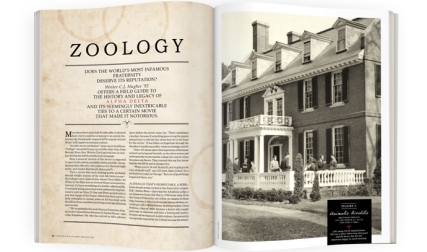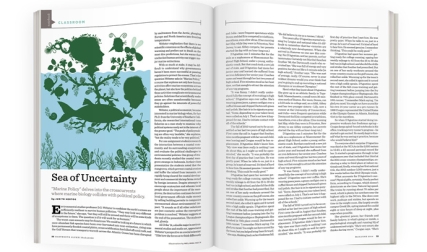Abbey D’Agostino turned onto the final straightaway of the NCAA cross-country championship course in Terre Haute, Indiana, just a quarter mile from the one collegiate title that had eluded her.
With black arm-warmers her only visible nod to the rough conditions that November day last year—high winds and 30-degree temperatures put the wind chill in the teens and the course was a muddy mess after two days of rain—D’Agostino had a straight line to victory. But it wasn’t a done deal: Emma Bates of Boise State and Kate Avery of Iona College were still in dogged pursuit.
D’Agostino, 21, the overwhelming favorite, carried the weight of expectations on her petite frame (she stands 5 feet, 2 1/2 inches in her racing spikes). She had near misses in her two previous attempts at a cross-country title. In 2011 she placed third, 1.7 seconds behind the winner. In 2012 she had been second, 0.7 seconds from the win. Even though she has won multiple national titles on the track—the indoor 5,000 and 3,000 meters in 2013 and the outdoor 5,000 meters in 2012 and 2013—her resume was not complete. D’Agostino wanted this one.
Her brow furrowed, no sign of the toothy grin that she’s famous for, mud caking her legs and her powerful arms driving her through the wind, D’Agostino charged toward the finish line. As she came into view it became clear to spectators that the other runners were vying for second.
“I vaguely remember being in disbelief that the other top girls had fallen behind, Bates especially,” D’Agostino says. “I knew I could win, but I didn’t anticipate gapping them that drastically. What struck me in that moment was that I had been given a gift. The entire situation—the lead I had, the strength I felt, the fact that the team was there—was such a blessing and something powerful was happening to me.”
D’Agostino sprinted across the line in 20:00.3, ahead of Bates, who was second in 20:03.9 on the 6-kilometer course. The margin of victory looks small on paper, but with elite athletes running at full speed, an 18-wheeler could fit into those three seconds. “Those aren’t conditions that she runs well in, so it showed her dominance,” says Mark Coogan, the women’s cross-country coach.
With her victory D’Agostino became the first Ivy League runner, male or female, to win the NCAA cross-country title. Once over the line she turned around to watch the rest of the Dartmouth squad come in. D’Agostino’s peers say she’s the consummate teammate, focused on their successes and improvement, psyching them up before big races and workouts with emails that range from funny to inspirational.
Dana Giordano ’16 was the next Dartmouth athlete to finish, in 31st place, for which she earned All-America honors. Cameras captured a picture of the two of them hanging on each other, more in relief than celebration.
“She was exhausted,” Giordano says about that moment. “I didn’t realize what it’s like for Abbey when she finishes a race in that situation. Everyone wants a piece of her; everyone wants to talk to her. It was nice to give her someone to lean on, to have a split second. Obviously she was the favorite, but [winning the cross-country title] wasn’t a given.”
Two years after D’Agostino started winning Ivy League and national titles it’s difficult to remember that her victories are a relatively new development. When she arrived in Hanover no one saw this coming. Not D’Agostino, not her parents, not her teammates. Certainly not Maribel Sanchez Souther ’96, the Dartmouth coach who recruited her. “She was full of energy and very positive, but she ran like a 5-minute mile [in high school],” Souther says. “She was sort of average, really. Of course, never in your wildest dreams would you ever think that you’re going to end up recruiting a national champion or an almost Olympian.”
Here’s what they knew about D’Agostino: She grew up in an athletic family in Topsfield, Massachusetts, a small town 30 minutes north of Boston. Her mom, Donna, ran a 5:03 mile in college and, as a child, Abbey and her two younger sisters—Lily, now a runner at the University of Connecticut, and Julia—were frequent spectators while Donna and dad Eric competed in triathlons, marathons, even a few ultras. (One morning last May, while they were in Princeton, New Jersey, to see Abbey compete, her parents started the day with an hour-long run.)
D’Agostino ran 5 minutes flat for the mile as a sophomore at Masconomet Regional High School, under a young, enthusiastic coach. But that coach took a new job out of state, and D’Agostino had mono her junior year and learned she suffered from an iron deficiency her senior year. Coaches came and went through her last two years of high school. Five minutes stood as her best time, not fast enough to attract the attention of any top programs.
“It was funny. I didn’t really understand fully the concept of recruiting in high school,” D’Agostino says over coffee. She’s wearing green jeans, a green cardigan over a ruffled blouse and chipped Dartmouth green nail polish. Her hair is in its signature ponytail. “Some, depending on your talent level, were called on July 1. That’s not how it happened for me. I had to initiate contact with all of the schools.”
The fall of 2010 turned out to be as unsettled as her last two years of high school. First came the call in August that Souther, nine months pregnant with her second child, was leaving and Coogan would be her replacement. D’Agostino didn’t know him. “My view was there really is nothing I can do about this, so I might as well be open-minded,” she recalls. “It was probably the first day of practice that I met him. He was pretty quiet. When he talks to us, just in a group, he’s sort of reserved. It’s kind of hard to hear him. He seemed genuine. I remember thinking, ‘This could be really good.’ ”
D’Agostino had spent her summer getting ready for college running, upping her weekly mileage to 45 from the 25 to 30 she had run in high school, and she did the drills and strides that Souther had prescribed. But on one of her early workouts around the cross-country course on the golf course, she rolled her ankle. Warming up for the team’s second meet, she rolled it again and it turned into a high ankle sprain. D’Agostino spent the rest of the fall cross-training and getting treatment before jumping into the Ivy League championships or Heptagonals. She finished in 75th place overall, Dartmouth’s 10th runner. “I remember Mark saying, ‘I’m glad you raced. You might not have scored for the team, but you helped bring them forward,’ ” she says, thinking back on her freshman fall. “He did believe in me as a runner, I think.”
If he didn’t believe at first, he did that spring. Coogan, 47, was the first one who saw D’Agostino’s talent developing. He is attuned to the development of distance runners, after his own 14-year career as a pro runner. In 1996 Coogan represented the United States at the Olympic Games in Atlanta, finishing 41st in the marathon.
So when D’Agostino started doing impressive workouts her freshman spring—Coogan keeps spiral-bound notebooks in his office, tracking every runner’s progress—he started to get excited. He mostly kept to himself what he was seeing at practice, because who would believe him?
To everyone else’s surprise D’Agostino was third at the NCAAs in the 5,000 meters in 15:40, a 43-second personal record for her. It started a progression through to her sophomore year that included that third at the 2011 cross-country championships, anchoring a relay to third place at indoor nationals and, finally, winning her first national title, the 2012 outdoor 5,000 meters, just a few weeks before the 2012 Olympic trials.
What accounts for D’Agostino’s success? Physical gifts, certainly. Nearly perfect form, according to Coogan, which doesn’t deteriorate as she tires. Natural leg speed. She trains by running about 70 miles per week, which is plenty, but nowhere near the highest tally in the NCAA. She does core work, pushups and strides, but spends no time in the weight room. She largely avoids campus Greek life, opting instead for a solid eight or nine hours of sleep at night, plus naps when possible.
Her greatest power, her friends and family believe, is what’s going on inside, a psychological strength and running IQ of undetermined origin. “She’s very smart; she thinks during races,” Coogan says. “She’s patient. A lot of people can’t run a 5K. They are wasting all this energy, zigzagging in and out, instead of just running for two miles to get where you belong. She’s really good at that. She trusts that it’s all going to happen, which is cool.”
D’Agostino is a psychological and brain sciences major, in part because of its applications to competitive running. With the rest of the class of 2014 D’Agostino returned to campus for sophomore summer. She did an independent research project, conducting a literature review and helping develop criteria Dartmouth would use to hire a sport psychologist for the athletic department. She took a keen interest in positive psychology, which focuses on helping people live optimally. “It’s looking at hope, resiliency, what helps people cope well, as opposed to what gets people depressed,” says professor Mark Detzer, her advisor that summer. In his opinion D’Agostino could be a poster child for positive psychology. “She’s very humble, approachable, friendly—there’s no ego,” he says. “How do you do what she has done and not have an ego? It seems like the way she approaches her life and her running is just so healthy.”
D’Agostino is a bit vague on how she applies her academic training to what happens on the track, but she says that when she’s in a race she thinks of all the hard work she has done in workouts. And she prepares for the pain. Coogan is blunt: Racing hurts. D’Agostino knows racing hurts. Best to be upfront about that. But what if it starts to hurt earlier in a race than you expected? “The minute you think that, you’ve already lost that race with yourself,” she says. “It’s a competition with myself for staying positive. The ultimate fear is allowing any negative thoughts to subvert my confidence.” When the hurt starts, there’s no change in strategy. You press on. When you’re tired and it’s time to sprint at the end, you sprint at the end. The decision has already been made.
No amount of positive psychology, however, can will term papers away, and if there’s one area where D’Agostino struggled in her first few years at Dartmouth it was in balancing academics with her racing schedule. Because the College’s academic schedule aligns closely with the three seasons of running, any time national competition nears, Dartmouth runners are in finals.
Her parents shake their heads, wondering how they can convince their perfectionist daughter that it’s okay to loosen up a little on her studies at a place that’s supposed to be all about the studying.
“Where were we when Abbey was finishing the paper in our [hotel] room?” Donna asks.
“Regionals,” Eric says. “In May most kids will be getting done. She’ll just be getting started with finals.”
Abbey, her mother says, wanted to feel like she deserved to be at the College, and not just because of the running. Coogan points to a long list of Ivy League runners who have thrived once they graduated and no longer had to study.
D’Agostino insists she’s gotten better at managing the stress, settling sometimes for less-than-perfect, although last November she excused herself from Thanksgiving dinner to finish a 20-page paper. Although she’s renowned for her laugh, a room-shaking shriek that penetrates a crowded cafeteria or a noisy team bus, the laughs die down at exam time.
D’Agostino’s celebrity first started growing, on campus and in running circles, in 2012, when she came within a fraction of a second of an Olympic berth. It was right after her first NCAA win in June, and D’Agostino was looking forward to being back on campus with her friends for sophomore summer. But first she qualified for one more meet—the U.S. Olympic trials.
As Eric drove his then-20-year-old daughter back to her hotel the night before the 5,000-meter final at the trials, she turned to him and said, “Dad, when is the Olympics?” For the first time, 24 hours before the race, the possibility that she could be going to London, instead of back to Dartmouth, appeared on her radar.
“I think it’s like the second week of August,” Eric remembers telling her. “I kind of looked at her and she said, ‘So basically my whole summer would be gone.’ ”
“Honestly!” Donna exclaims, shaking her head at the memory of her daughter’s priorities.
“It wasn’t until then that it dawned on her that she had a shot,” Eric says.
Coogan didn’t need any convincing. He told anyone who asked that she would be right in it. And as the race unfolded D’Agostino was in the front pack, right where she should be for the first two miles. If she finished in the top three, she would have to say goodbye to sophomore summer.
As it played out, Julia Lucas, an Oregon Track Club runner, pushed the pace and opened up a large lead on the pack with three laps to go. D’Agostino hung back with the trailing group, in seventh place. With about 800 meters to go, Molly Huddle, the American record-holder in the event, jockeyed her way into second place, the front of the chase pack, while D’Agostino trailed several yards behind.
With one lap remaining D’Agostino was in fourth, and the television cameras were trained on Lucas, struggling in the front. D’Agostino wasn’t in the picture until a furious kick started. Huddle moved along the backstretch. Julie Culley went with her and they passed Lucas, who was slowing to a painful crawl. D’Agostino seemed unaware that she could catch Lucas, who was completely spent. Kim Conley, in fifth place, launched a kick that took her past D’Agostino at the top of the homestretch and then past Lucas to take the third spot on the team in 15:19.79. Lucas was fourth, 0.04 seconds back in 15:19.83, and D’Agostino fifth in 15:19.98. She had missed the Olympic team by 0.19 seconds.
Arianna Vailas ’14, D’Agostino’s teammate and co-captain, had started a campaign to gather students on campus to watch D’Agostino in the trials en masse. An email went out from the athletic department and a crowd of at least 40 students gathered at a fraternity house to watch her. It was an outpouring of affection for the campus celebrity with the giant smile and the Dartmouth singlet among the Saucony and Nike and Asics uniforms.
In the dim light of the house living room Vailas and another buddy had the idea of putting an iPhone on the mantelpiece, just below the flat-screen TV that hung there, to film for their friend the reaction of the crowd as they rooted for her. The three-minute clip, taken at the end of the race, shows only half the room, sophomores crowded onto couches and chairs, standing and kneeling on the floor, shouting and pleading at the TV. At the finish they raise their hands to their heads in disbelief. Then comes a collective sigh when it becomes clear London wasn’t happening.
Across the country, D’Agostino met with reporters and expressed her disappointment. Her voice cracked and tears flowed. She wiped her eyes as she spoke about the support from back home. Ever gracious, she praised Conley. Within a minute she regained her composure and talked about how every experience leads to improvement. “It’s not fair to be upset,” she said. “I’ve had such a great year.”
Mercifully, the reporters stopped asking her about the race and asked her what’s next. “Time off,” she said. “Yeah. I’m living at school this summer. It’s a regular academic term for us.” The tears are gone and her face brightened to its default state, genuine smile, eyes up. “I’m really excited to go back and be with my teammates.”
There will be other chances. As spring track season began D’Agostino was starting to consider her post-graduation options. “The goal is to sign a contract and run professionally,” she says, “but I’m keeping my options open.” This is a low-key year for professional runners, with no Olympic team or world championships to qualify for, which makes it a good time for D’Agostino to transition to life as a pro. At the U.S. outdoor national championship meet in June she won’t be wearing her Dartmouth singlet. The question is, which shoe and apparel company—Nike? Saucony? Brooks? New Balance?—will be employing her.
In early January Coogan announced that he would be leaving Dartmouth at the end of the academic year and joining New Balance in Boston to work in marketing and coach some of the company’s elite athletes. Through the spring he’s maintaining two jobs: He’s coaching the Dartmouth distance women, driving to Hanover for their hard workouts on Tuesdays and traveling to meets with them. The other days he’s already in Boston. Observers of the elite running scene think the move was a way to coax D’Agostino to sign with New Balance upon graduation, with her trusted coach in place to continue guiding her.
Until then she’s continuing her dominance of NCAA competition—and getting plenty of recognition for it. One week, Sports Illustrated. The next, The Boston Globe. “She is very humble about the whole process, her celeb status,” says Vailas. “We joke about it with her, because she jokes about it herself.”
In January D’Agostino broke her own Ivy League indoor mile record, running 4:28.31. At the NCAA indoor national meet in March in Albuquerque, New Mexico, she won both the 3,000- and 5,000-meter events, defending her titles from 2013. D’Agostino became the first woman ever to win those events in the same meet in consecutive years. Outdoors, she’s likely to go for her third consecutive NCAA 5,000-meter title in Eugene, Oregon, mid-June.
Coogan says it has been fun to watch D’Agostino continue to develop her talent through her senior year, going to the front at races and pushing the pace instead of relying on others to lead. “I think she’s maturing as an athlete,” he says. As graduation approaches and the Abbey era ends, she’ll hold a unique spot in Big Green’s pantheon of athletes. “Dartmouth is really lucky to have her,” he says. “You’ll get All-Americans, but it’s hard to get multiple-time NCAA champions in a non-scholarship school. She’s a once-in-a-lifetime track and field athlete to come through.”
Sarah Lorge Butler is a senior editor at Running Times magazine who lives near Allentown, Pennsylvania. A version of this story appeared in the September 2013 issue of Running Times. © Rodale Inc. 2013. All rights reserved.




